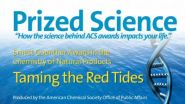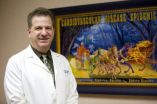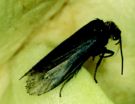(Press-News.org) WASHINGTON, Nov. 22, 2010 — The science that helped make today's smartphones and iPods smaller but more powerful than yesterday's desktop computers highlights the latest episode in the American Chemical Society (ACS) Prized Science video series.
The new high-definition video, released today, focuses on IBM chemist Robert Miller, winner of the 2010 ACS Award for Chemistry of Materials. Miller developed materials that helped pack more transistors onto each computer chip, those postage stamp-size slivers of silicon that make up the brains of computers and other electronic devices. In doing so, computer chips became smaller, faster, and more powerful — sustaining the rapid miniaturization underpinning the consumer electronics revolution.
It is the third episode in Prized Science: How the Science Behind ACS Awards Impacts Your Life, from the American Chemical Society (ACS), the world's largest scientific society. Rich with high-definition graphics and animations, and commentary suitable for classroom use and other audiences of students and non-scientists, the videos are available without charge at the Prized Science website, YouTube, iTunes and on DVD.
ACS encourages educators, schools, museums, science centers, news organizations, and others to embed links to Prized Science on their websites. An additional episode in the series, which focuses on ACS' 2010 award recipients, will be issued in December.
"Estimates suggest that more than 30,000 significant prizes ― most for scientific or medical research ― are awarded annually," noted ACS President Joseph S. Francisco, Ph.D. "For many of them, the spotlight of news media publicity rightly focuses on the recipients. Often lost behind the headlines, is an explanation of how the science honored in the award impacts the everyday lives of people throughout the world. That is Prized Science's goal, to give greater visibility to the science that won the prize. In doing so, Prized Science strives to give people who may have no special scientific knowledge, the opportunity to watch, listen, and discover how the chemistry behind ACS' awards transforms life."
"Shrinking the Computer Chip" joins Prized Science episodes on:
"Are We All From Mars?" Featuring Richard Zare, Ph.D., winner of the 2010 Priestley Medal, highest honor bestowed by ACS. Zare is the Marguerite Blake Wilbur Professor in Natural Science at Stanford University. The video highlights Zare's work on the possibility that life existed on Mars and seeded life on Earth; in developing the technology that helped scientists decode the human genome; and in pioneering efforts to enlist nanoparticles in medicine
"Green Gasoline" Featuring Vincent D'Amico, Ph.D., Emiel van Broekhoven, Ph.D., and Juha Jakkula, Ph.D., winners of the ACS Award for Affordable Green Chemistry. They invented an environmentally friendly process for making a key ingredient of "green gasoline," a greener motor vehicle fuel.
Scheduled for December is Prized Science episode No. 4:
"Taming the Toxic Tides" Featuring Michael Crimmins, Ph.D., winner of the Ernest Guenther Award in the Chemistry of Natural Products, whose research underpins efforts to develop treatments for a terrible form of food poisoning involving shellfish.
INFORMATION:
The ACS administers more than 60 national awards to honor accomplishments in chemistry and service to chemistry. The nomination process involves submission of forms, with winners selected by a committee consisting of ACS members who typically are technical experts in the nominee's specific field of research.
The American Chemical Society is a nonprofit organization chartered by the U.S. Congress. With more than 161,000 members, ACS is the world's largest scientific society and a global leader in providing access to chemistry-related research through its multiple databases, peer-reviewed journals and scientific conferences. Its main offices are in Washington, D.C., and Columbus, Ohio.
New American Chemical Society Prized Science video focuses on shrinking the computer chip
2010-11-23
ELSE PRESS RELEASES FROM THIS DATE:
University of Minnesota engineering researcher finds new way to fight antibiotic-resistant bacteria
2010-11-23
New findings by civil engineering researchers in the University of Minnesota's College of Science and Engineering shows that treating municipal wastewater solids at higher temperatures may be an effective tool in the fight against antibiotic-resistant bacteria.
Heating the solid waste to 130 degrees Fahrenheit (55 degrees Celsius) was particularly effective in eliminating the genes that confer antibiotic resistance. These genes are used by bacteria to become resistant to multiple antibiotics, which are then known as "superbacteria" or "superbugs."
The research paper ...
The not-so-sweet truth about sugar -- a risk choice?
2010-11-23
More and more people have become aware of the dangers of excessive fructose in diet. A new review on fructose in an upcoming issue of the Journal of the American Society of Nephrology (JASN) indicates just how dangerous this simple sugar may be.
Richard J. Johnson, MD and Takahiko Nakagawa, MD (Division of Renal Diseases and Hypertension, University of Colorado) provide a concise overview of recent clinical and experimental studies to understand how excessive amounts of fructose, present in added sugars, may play a role in high blood pressure, diabetes, obesity, and ...
Perceptual training improves vision of the elderly
2010-11-23
RIVERSIDE, Calif. – Elderly adults can improve their vision with perceptual training, according to a study from the University of California, Riverside and Boston University that has implications for the health and mobility of senior citizens.
The study, "Perceptual learning, aging, and improved visual performance in early stages of visual processing," appears in the current online issue of the Journal of Vision. It was funded by a $3.5 million grant from the National Institute on Aging.
UCR researchers G. John Andersen, professor of psychology; Rui Ni, formerly a postdoctoral ...
HIV drugs interfere with blood sugar, lead to insulin resistance
2010-11-23
The same powerful drugs that have extended the lives of countless people with HIV come with a price – insulin resistance that can lead to diabetes and cardiovascular disease.
Now, researchers at Washington University School of Medicine in St. Louis have determined why that happens. Their research shows that HIV protease inhibitors directly interfere with the way blood sugar levels are controlled in the body. This leads to insulin resistance, a condition that occurs when the body produces enough insulin but doesn't use it properly.
This confirmation provides the potential ...
Number of doctorates awarded continued to grow in 2009
2010-11-23
U.S. academic institutions awarded 49,562 research doctorate degrees in 2009, the highest number ever reported by the National Science Foundation's Survey of Earned Doctorates (SED), and a 1.6 percent increase over 2008's total of 48,802.
The SED is an annual census of all individuals who receive a research doctorate from a U.S. academic institution in an academic year, which is July 1 through June 30 of the following year. The 2009 census covered individuals who earned doctorates in the academic year ending June 2009. NSF's Science Resources Statistics division compiled ...
AGU highlights: Nov. 22, 2010
2010-11-23
The following highlights summarize research papers that have been recently published in Geophysical Research Letters (GRL), Water Resources Research (WRR), and Journal of Geophysical Research - Earth Surface (JGR-F).
In this release:
Changing winds can influence amounts of carbon dioxide the ocean holds
Large methane release from ocean sediments during glacial periods?
Magnetic island observed at Earth's magnetopause
Understanding particle movement improves models of stream erosion and deposition
New method for assessing uncertainty in groundwater models
...
Gene find could lead to healthier food, better biofuel production
2010-11-23
WEST LAFAYETTE, Ind. - Purdue University scientists have found the last undiscovered gene responsible for the production of the amino acid phenylalanine, a discovery that could lead to processes to control the amino acid to boost plants' nutritional values and produce better biofuel feedstocks.
Natalia Dudareva, a distinguished professor of horticulture, and Hiroshi Maeda, a postdoctoral researcher in Dudareva's laboratory, determined that the gene is one of 10 responsible for phenylalanine production in plants. Understanding how the amino acid is produced could provide ...
The puzzle of biological diversity
2010-11-23
Biologists have long thought that interactions between plants and pollinating insects hasten evolutionary changes and promote biological diversity. However, new findings show that some interactions between plants and pollinators are less likely to increase diversity than previously thought, and in some instances, reduce it.
Findings, published in the Journal of Evolutionary Biology, show that local populations of one of the most distinctive plants in the Mojave Desert, the Joshua tree, are not as biologically diverse as would be expected. Joshua trees cannot produce seeds ...
Upper-class people have trouble recognizing others' emotions
2010-11-23
Upper-class people have more educational opportunities, greater financial security, and better job prospects than people from lower social classes, but that doesn't mean they're more skilled at everything. A new study published in Psychological Science, a journal of the Association for Psychological Science, finds surprisingly, that lower-class people are better at reading the emotions of others.
The researchers were inspired by observing that, for lower-class people, success depends more on how much they can rely on other individuals. For example, if you can't afford ...
Study could mean greater anticipated global warming
2010-11-23
Current state-of-the-art global climate models predict substantial warming in response to increases in greenhouse gases such as carbon dioxide. The models, though, disagree widely in the magnitude of the warming we can expect. The disagreement among models is mainly due to the different representation of clouds. Some models predict that global mean cloud cover will increase in a warmer climate and the increased reflection of solar radiation will limit the predicted global warming. Other models predict reduced cloudiness and magnified warming. In a paper that has just appeared ...



